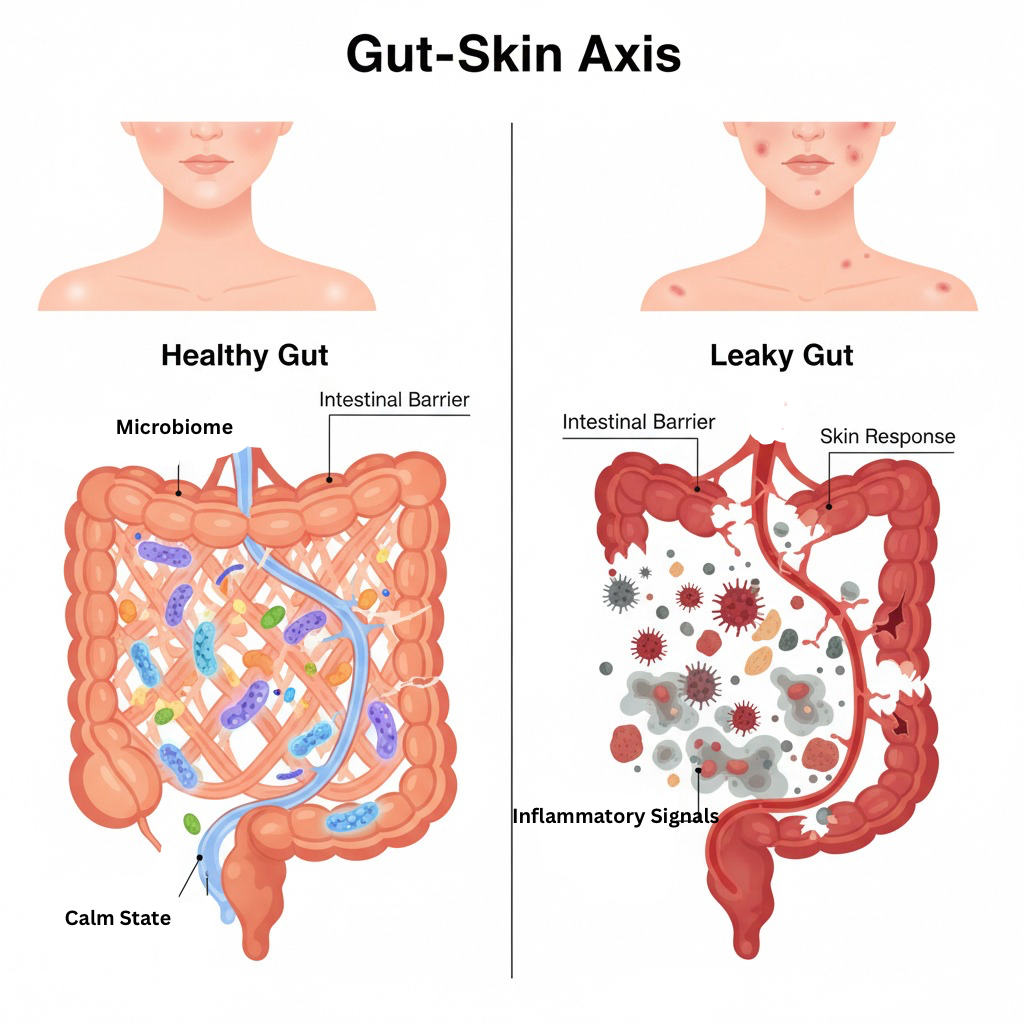Decoding the Glow: How Your Gut Health Is Written on Your Skin
By Dr. Aire, Founder of Evolutionaire
Have you ever found yourself meticulously following a skincare routine – the cleansers, the serums, the moisturizers, the sunscreen – only to be met with persistent skin challenges? Perhaps it's those stubborn breakouts, the frustrating dark spots (medically known as Post-Inflammatory Hyperpigmentation), or simply a complexion that lacks the vibrant radiance you crave. You’re doing everything right, or so it seems, but your skin isn't reflecting your efforts. It can be incredibly disheartening.
What if the secret to truly healthy, glowing skin isn't found in a new product, but rather deep within your own body? Today, we're going to decode one of the most powerful and often overlooked connections in dermatology: the gut-skin axis. This intricate communication pathway between your digestive system and your skin is a game-changer. For individuals with melanin-rich skin, understanding and optimizing this axis is not just beneficial – it's absolutely fundamental to achieving and maintaining a clear, even, and radiant complexion.
Join us as we explore how your internal wellness directly impacts your external glow, and learn how to harness the power of your gut for the skin you've always desired.
Healthy Microbiome vs Unhealthy Microbiome (Dysbiosis).
To truly appreciate the power of the gut-skin connection, let's simplify the science. Imagine your gut, or more specifically, your gastrointestinal tract, as your body's central command center. Within this intricate system lives a vast and diverse community of microorganisms – trillions of bacteria, viruses, and fungi – collectively known as your gut microbiome. This isn't just a passive resident; it's an active player in your health, influencing everything from nutrient absorption to immune function and even mood.
When your gut microbiome is in a state of healthy balance, it functions harmoniously: efficiently digesting food, absorbing vital nutrients, and even producing essential vitamins. However, when this delicate ecosystem falls out of balance, a condition known as dysbiosis, problems begin to emerge.
One of the key issues that can arise from dysbiosis is a compromised gut lining, often referred to as "leaky gut" or increased intestinal permeability. Think of your gut lining as a finely woven mesh designed to let beneficial nutrients through while keeping harmful substances out. When this mesh becomes damaged, unwanted particles – such as toxins, undigested food molecules, and microbial byproducts – can escape into your bloodstream. Your immune system, perceiving these as threats, mounts a defense, triggering a cascade of chronic, low-grade inflammation that can affect various systems throughout your body.
And where do these systemic inflammatory signals often make their debut? Our skin! The skin, being the body's largest organ, acts as a visible messenger, often displaying the initial signs of this internal inflammation. Conditions such as persistent acne, eczema, unexplained rashes, or even rosacea are frequently the skin's way of sending a distress signal, indicating that something deeper within your body, particularly in your gut, needs attention.
Post Inflammatory Hyperpigmentation (PIH) .
Now, let's lean in for this part. This is why the gut-skin axis is a non-negotiable topic for us – for those of us with melanin-rich skin. Our melanocytes – the specialized cells responsible for producing melanin – are remarkably efficient. This is a magnificent evolutionary adaptation, providing inherent protection against harmful ultraviolet (UV) radiation, which contributes to the well-known adage, "Black don't crack!"
However, this heightened efficiency of melanin production has a significant implication: our skin is more prone to developing Post-Inflammatory Hyperpigmentation (PIH). Any form of inflammation or trauma to the skin – be it from an acne breakout, a rash, a cut, or even harsh topical irritation – can trigger our hyper-responsive melanocytes to produce an excess of pigment in that localized area. The result? Those persistent, often frustrating dark spots that linger long after the initial issue has healed.
Now, connect this back to the gut-skin axis:
* When your gut health is compromised, and chronic low-grade inflammation is simmering internally, it creates a systemic inflammatory environment throughout your entire body.
* This internal inflammation makes your skin inherently more reactive and susceptible to external inflammation, whether it's from daily environmental stressors or an internal imbalance.
* For melanin-rich skin, this increased inflammatory state means a higher likelihood of triggering those reactive melanocytes, leading to more frequent and more pronounced PIH.
The chain becomes clear: Poor Gut Health → Systemic Inflammation → Inflamed Skin → Exaggerated Pigment Response (PIH). Decoding this biological chain is not just academic; it's the fundamental first step in gaining control over recurring dark spots and achieving a truly even, luminous complexion. Understanding this connection empowers you to address the root cause, rather than just treating the symptoms.
The Evolutionary Mismatch: Modern Diets vs. Our Ancestral Blueprint
So what's the deal? Honestly, it boils down to an evolutionary mismatch.
The journey to understanding our current gut health challenges often leads us back to our evolutionary roots. For millennia, human bodies, particularly those evolved in diverse geographical regions including Africa, were optimized for diets rich in whole, unprocessed foods. These ancestral eating patterns typically featured an abundance of diverse plant matter, lean proteins, natural fibers, and often, fermented foods. This dietary blueprint naturally supported a robust and balanced gut microbiome.
Think of it like this: our bodies are running on ancient, time-tested hardware, but our modern diet is like brand-new, demanding software. Sooner or later, the system gets overloaded and starts sending out error signals… and that's the inflammation.
This contemporary way of eating is often characterized by:
* Highly processed foods: Stripped of natural fibers and nutrients.
* Refined sugars: Fueling inflammatory processes and imbalances in gut bacteria.
* Unhealthy fats: Contributing to systemic inflammation.
* Artificial additives: Potentially disrupting gut integrity.
These dietary staples act like a banquet for the "bad" or pro-inflammatory bacteria in our gut, promoting dysbiosis and perpetuating the cycle of chronic inflammation we discussed earlier. Instead of nourishing a thriving internal garden, we are inadvertently feeding a fire that manifests as internal and external distress.
By recognizing this fundamental shift from our ancestral dietary blueprint, we gain critical insight. It's not about strict adherence to a historical diet, but about understanding the principles that promote gut health, allowing us to make informed choices that realign our bodies with their innate design. This realignment is a powerful step towards cultivating a flourishing internal ecosystem that directly translates to radiant skin.
Understanding the "why" is crucial, but now it's time for the "how." Here are four actionable keys, your personal "cipher" for cultivating a healthy gut that will translate into undeniable radiance for your melanin-rich skin.
Key 1: Feed Your Allies – Embrace Prebiotics & Probiotics
Your gut microbiome thrives on variety and specific nutrients. Think of this as nurturing the beneficial bacteria that keep your gut functioning optimally.
* Prebiotics: The "Fertilizer" for Good Bacteria: These are non-digestible fibers that act as food for your beneficial gut bacteria.
* Examples: Garlic, onions, leeks, asparagus, bananas (slightly green), oats, apples, flaxseeds, and a wide array of leafy greens.
* Probiotics: The "Good Bacteria" Themselves: Directly introduce beneficial microorganisms into your system.
* Examples: Fermented foods like plain yogurt (with live active cultures), kefir, kimchi, sauerkraut, kombucha, and tempeh. Consider a high-quality probiotic supplement if advised by a healthcare professional.
Key 2: Extinguish the Fire – Prioritize Anti-Inflammatory Foods
Actively combat systemic inflammation by incorporating foods renowned for their anti-inflammatory properties.
* Omega-3 Fatty Acids: Crucial for calming inflammation.
* Examples: Fatty fish like salmon, mackerel, sardines; plant-based sources include flaxseeds, chia seeds, and walnuts.
* Polyphenols & Antioxidants: These powerful compounds protect cells from damage and reduce inflammation.
* Examples: Vibrant berries (blueberries, raspberries, strawberries), dark leafy greens (spinach, kale, collard greens), colorful vegetables (bell peppers, broccoli), green tea, and even high-quality dark chocolate.
* Anti-Inflammatory Spices: Harness the ancient power of spices.
* Examples: Turmeric (always consume with black pepper for enhanced absorption), ginger, and cinnamon.
Key 3: Tame the Stress Response – Nurture the Mind-Gut Link
The brain and gut are intimately connected via the vagus nerve. Chronic stress directly impacts gut integrity and function, exacerbating inflammation.
* Mindfulness & Relaxation Techniques: Even short bursts of intentional calm can make a difference.
* Examples: Daily deep breathing exercises, meditation, gentle yoga, progressive muscle relaxation, or simply taking a few moments of quiet reflection.
* Prioritize Quality Sleep: Inadequate sleep elevates stress hormones and can negatively impact the gut microbiome. Aim for 7-9 hours of restorative sleep per night.
* Movement: Regular, moderate physical activity can reduce stress and improve gut motility.
* Examples: Daily walks, swimming, dancing – find what brings you joy.
Key 4: Hydrate for Health – The Foundation of Wellness
Often overlooked, adequate hydration is fundamental for every bodily function, including digestive health.
* Essential for Gut Integrity: Water helps maintain the mucosal lining of your intestines, which is crucial for a healthy barrier.
* Supports Digestion: Aids in the breakdown of food and the smooth passage of waste, preventing constipation which can exacerbate gut issues.
* Recommendation: Make water your primary beverage. Aim for at least 8 glasses (around 2 liters) per day, and more if you're active or in a warm climate.
There you have it. The secret to radiant, even-toned skin, particularly for those with melanin-rich complexions, extends far beyond the surface. It’s an intricate dance between external care and internal wellness, where your gut health plays a leading role. By understanding and actively nurturing the gut-skin axis, you unlock a powerful biological pathway that can transform your complexion from the inside out.
No amount of topical treatment can fully counteract the effects of chronic internal inflammation stemming from a compromised gut. By prioritizing gut health through conscious dietary choices, stress management, and proper hydration, you are giving your body the ultimate tools to naturally calm inflammation, regulate pigment production, and achieve a lasting, healthy glow that resonates with your ancestral blueprint for wellness.
Your radiance isn't just about flawless skin; it's a reflection of your holistic health. You have the power to rewrite your skin's story, one gut-healthy choice at a time. It begins not with a new product, but with a new perspective on wellness – a perspective that starts from within.
What is one small change you’ll make this week to support your gut health? Share your commitment in the comments below!





